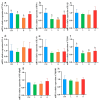Rhodotorula Yeast Culture Improved the Antioxidant Capacity, Lipid Metabolism, and Immunity of Sheep Livers
- PMID: 40284815
- PMCID: PMC12030957
- DOI: 10.3390/vetsci12040314
Rhodotorula Yeast Culture Improved the Antioxidant Capacity, Lipid Metabolism, and Immunity of Sheep Livers
Abstract
There is currently no research on the application evaluation of R. mucilaginosa yeast culture (RYC) in animal production. Therefore, this study investigated the effects of RYC on the antioxidant capacity, lipid metabolism, and immunity of sheep livers. Twenty-four 3-month-old Duhan male sheep (36 ± 4 kg) were divided into four groups. The control group received a basal diet, the L group received a basal diet + 10 g/sheep/day RYC, the M group received a basal diet + 20 g/sheep/day RYC, and the H group received a basal diet + 40 g/sheep/day RYC. The trial lasted for 75 days. The results showed that the content of glutathione peroxidase in the livers of sheep in group M was significantly increased by 26.6%, and the content of malondialdehyde was significantly decreased by 38% (p < 0.05). Additionally, the serum levels of total cholesterol, triglycerides, high-density lipoprotein cholesterol, and low-density lipoprotein cholesterol significantly decreased; the liver content of C16:0 decreased; and the levels of C18:2n6C and C20:1 increased (p < 0.05). Furthermore, the contents of cytokines TNF-α and IFN-γ in sheep livers from the M group were also significantly decreased by 20% and 24.8%, respectively (p < 0.05). These findings suggest that supplementation with 20 g/sheep/day RYC can enhance antioxidant capacity, improve lipid metabolism, and reduce inflammation in sheep livers, which is advantageous for farming healthy sheep.
Keywords: Rhodotorula yeast culture; antioxidation; fatty acid; immunity; lipid metabolism; sheep.
Conflict of interest statement
The authors declare no conflicts of interest.
Figures



References
-
- Lin L.X., Cao Q.Q., Zhang C.D., Xu T.-T., Yue K., Li Q., Liu F., Wang X., Dong H.-J., Huang S.-C., et al. Aflatoxin B1 causes oxidative stress and apoptosis in sheep testes associated with disrupting rumen microbiota. Ecotoxicol. Environ. Saf. 2022;232:113225. doi: 10.1016/j.ecoenv.2022.113225. - DOI - PubMed
-
- Van Wettere W.H.E.J., Kind K.L., Gatford K.L., Swinbourne A.M., Leu S.T., Hayman P.T., Kelly J.M., Weaver A.C., Kleemann D.O., Walker S.K. Review of the impact of heat stress on reproductive performance of sheep. J. Anim. Sci. Biotechnol. 2021;12:26. doi: 10.1186/s40104-020-00537-z. - DOI - PMC - PubMed
Grants and funding
LinkOut - more resources
Full Text Sources

